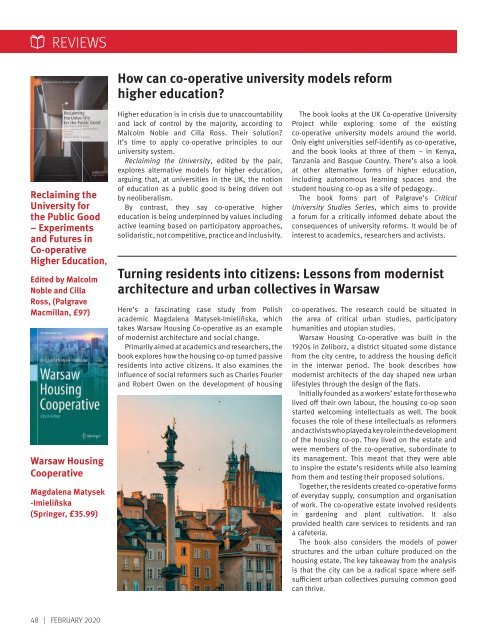Co-op News - February 2020
Co-operative Retail: ethical challenges in the modern world
Co-operative Retail: ethical challenges in the modern world
You also want an ePaper? Increase the reach of your titles
YUMPU automatically turns print PDFs into web optimized ePapers that Google loves.
REVIEWS<br />
How can co-<strong>op</strong>erative university models reform<br />
higher education?<br />
Reclaiming the<br />
University for<br />
the Public Good<br />
– Experiments<br />
and Futures in<br />
<strong>Co</strong>-<strong>op</strong>erative<br />
Higher Education,<br />
Edited by Malcolm<br />
Noble and Cilla<br />
Ross, (Palgrave<br />
Macmillan, £97)<br />
Warsaw Housing<br />
<strong>Co</strong><strong>op</strong>erative<br />
Magdalena Matysek<br />
-Imieliñska<br />
(Springer, £35.99)<br />
Higher education is in crisis due to unaccountability<br />
and lack of control by the majority, according to<br />
Malcolm Noble and Cilla Ross. Their solution?<br />
It’s time to apply co-<strong>op</strong>erative principles to our<br />
university system.<br />
Reclaiming the University, edited by the pair,<br />
explores alternative models for higher education,<br />
arguing that, at universities in the UK, the notion<br />
of education as a public good is being driven out<br />
by neoliberalism.<br />
By contrast, they say co-<strong>op</strong>erative higher<br />
education is being underpinned by values including<br />
active learning based on participatory approaches,<br />
solidaristic, not competitive, practice and inclusivity.<br />
Here’s a fascinating case study from Polish<br />
academic Magdalena Matysek-Imieliñska, which<br />
takes Warsaw Housing <strong>Co</strong>-<strong>op</strong>erative as an example<br />
of modernist architecture and social change.<br />
Primarily aimed at academics and researchers, the<br />
book explores how the housing co-<strong>op</strong> turned passive<br />
residents into active citizens. It also examines the<br />
influence of social reformers such as Charles Fourier<br />
and Robert Owen on the devel<strong>op</strong>ment of housing<br />
The book looks at the UK <strong>Co</strong>-<strong>op</strong>erative University<br />
Project while exploring some of the existing<br />
co-<strong>op</strong>erative university models around the world.<br />
Only eight universities self-identify as co-<strong>op</strong>erative,<br />
and the book looks at three of them – in Kenya,<br />
Tanzania and Basque <strong>Co</strong>untry. There’s also a look<br />
at other alternative forms of higher education,<br />
including autonomous learning spaces and the<br />
student housing co-<strong>op</strong> as a site of pedagogy.<br />
The book forms part of Palgrave’s Critical<br />
University Studies Series, which aims to provide<br />
a forum for a critically informed debate about the<br />
consequences of university reforms. It would be of<br />
interest to academics, researchers and activists.<br />
Turning residents into citizens: Lessons from modernist<br />
architecture and urban collectives in Warsaw<br />
co-<strong>op</strong>eratives. The research could be situated in<br />
the area of critical urban studies, participatory<br />
humanities and ut<strong>op</strong>ian studies.<br />
Warsaw Housing <strong>Co</strong>-<strong>op</strong>erative was built in the<br />
1920s in Zoliborz, a district situated some distance<br />
from the city centre, to address the housing deficit<br />
in the interwar period. The book describes how<br />
modernist architects of the day shaped new urban<br />
lifestyles through the design of the flats.<br />
Initially founded as a workers’ estate for those who<br />
lived off their own labour, the housing co-<strong>op</strong> soon<br />
started welcoming intellectuals as well. The book<br />
focuses the role of these intellectuals as reformers<br />
and activists who played a key role in the devel<strong>op</strong>ment<br />
of the housing co-<strong>op</strong>. They lived on the estate and<br />
were members of the co-<strong>op</strong>erative, subordinate to<br />
its management. This meant that they were able<br />
to inspire the estate’s residents while also learning<br />
from them and testing their pr<strong>op</strong>osed solutions.<br />
Together, the residents created co-<strong>op</strong>erative forms<br />
of everyday supply, consumption and organisation<br />
of work. The co-<strong>op</strong>erative estate involved residents<br />
in gardening and plant cultivation. It also<br />
provided health care services to residents and ran<br />
a cafeteria.<br />
The book also considers the models of power<br />
structures and the urban culture produced on the<br />
housing estate. The key takeaway from the analysis<br />
is that the city can be a radical space where selfsufficient<br />
urban collectives pursuing common good<br />
can thrive.<br />
48 | FEBRUARY <strong>2020</strong>


















